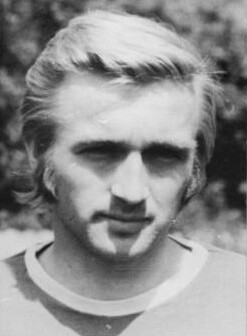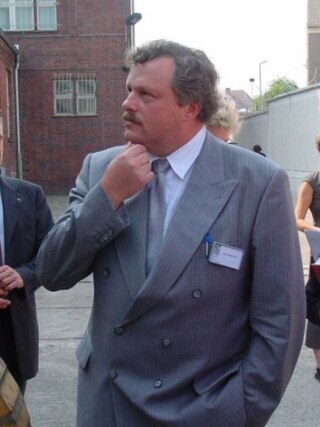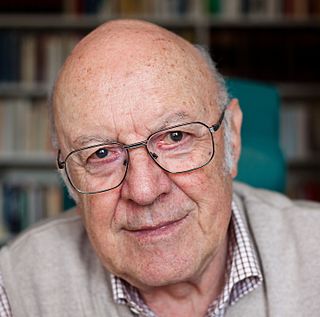
The Ministry for State Security, commonly known as the Stasi, was the state security service and secret police of East Germany from 1950 to 1990.

Hans Modrow was a German politician best known as the last communist premier of East Germany.

Ulf Kirsten is a German former professional footballer who played as a striker. Nicknamed Der Schwatte, he is the first player in history to reach a total 100 caps playing with two different national teams. Kirsten's biggest success was the victory of the 1992–93 DFB-Pokal.

Sportgemeinschaft Dynamo Dresden e.V., commonly known as SG Dynamo Dresden or Dynamo Dresden, is a German association football club based in Dresden, Saxony. They were founded on 12 April 1953 as a club affiliated with the East German police and became one of the most popular and successful clubs in East German football, winning eight league titles.

Berliner Fussball Club Dynamo e. V., commonly abbreviated to BFC Dynamo or BFC, alternatively sometimes called Dynamo Berlin, is a German football club based in the locality of Alt-Hohenschönhausen of the borough of Lichtenberg of Berlin.

Manfred Roeder was a German lawyer and Neo-Nazi terrorist. Roeder was a Holocaust denier and an early representative of the Reichsbürger movement.

Siegmar Wätzlich was a German footballer.
The football league system of the German Democratic Republic existed from 1949 until shortly after German reunification in 1991.
Football club was a designation for a specially promoted club for elite football in East Germany. The football clubs were formed in 1965 and 1966 as centers of excellence in East German football. The football clubs enjoyed considerable advantages over other sports communities in East German football in terms of material conditions and talent recruitment. All designated football clubs had their own catchment areas and promising players were ordered to play for them. In addition to the ten designated football clubs, sports community SG Dynamo Dresden was also promoted in a similar way to the designated football clubs from 1968.

Siegfried Reiprich is a German human rights activist and author. He was involved in the resistance against the communist regime of the German Democratic Republic (GDR), which led to him being expelled from university and eventually banished from the GDR. In 2009, he was appointed by the Government of Saxony as the Director of the Stiftung Sächsische Gedenkstätten. In 2011, he was elected as a member of the Executive Board of the Platform of European Memory and Conscience.
Zersetzung was a psychological warfare technique used by the Ministry for State Security (Stasi) to repress political opponents in East Germany during the 1970s and 1980s. Zersetzung served to combat alleged and actual dissidents through covert means, using secret methods of abusive control and psychological manipulation to prevent anti-government activities. People were commonly targeted on a pre-emptive and preventive basis, to limit or stop activities of dissent that they may have gone on to perform, and not on the basis of crimes they had actually committed. Zersetzung methods were designed to break down, undermine, and paralyze people behind "a facade of social normality" in a form of "silent repression".

Johann Burianek was a former Wehrmacht soldier and CIA-backed insurgent who planned and committed several attacks against the German Democratic Republic and a member of the anti-communist KGU.
Wolfgang Kaiser was a member of Rainer Hildebrandt's "Struggle against Inhumanty" group which campaigned against the one party dictatorship in the German Democratic Republic.

Helmut Müller-Enbergs is a German political scientist who has written extensively on the Stasi and related aspects of the German Democratic Republic's history.

Thomas Ammer is a German historian who as a young man studied to become a physician. He was arrested and imprisoned in 1958 for anti-government political activism in East Germany and he never qualified as a medical doctor. His 15-year prison sentence was cut short in August 1964 when his release was purchased by the West German government, and at the age of 27 he relocated to the German Federal Republic.

Karl Wilhelm Fricke is a German political journalist and author. He has produced several of the standard works on resistance and state repression in the German Democratic Republic (1949–1990). In 1955, he became one of several hundred kidnap victims of the East German Ministry for State Security, captured in West Berlin and taken to the east where for nearly five years he was held in state detention.
Bernd Eisenfeld, also known by the pseudonym Fred Werner, was an opponent of the East German dictatorship who became a writer and an historian.
William Borm was a German politician, of the Free Democratic Party (FDP). He was a member of the Bundestag from 1965 to 1972, and a member of the FDP National Executive Committee from 1960 to 1982. Several years after his death, it was revealed that since the late 1950s he had been an agent of the Stasi, the State Security Service of the German Democratic Republic.

The Memorial and Education Centre Andreasstraße, is a museum in Erfurt, Germany, which is housed in a former prison used by the East German Ministry for State Security (Stasi). It is informally known as the Stasi Museum.

Leipzig Prison was a prison in Leipzig, Germany. Built together with an adjacent court building in 1906, it was used as a prison until 2003. During East German rule, a secret part of the prison was used as the central execution site of East Germany. In 1981, Werner Teske was the final person executed here. The prison was used until 2003, the site is now used as an extension of the nearby court building, with the execution site remaining as a memorial site.












